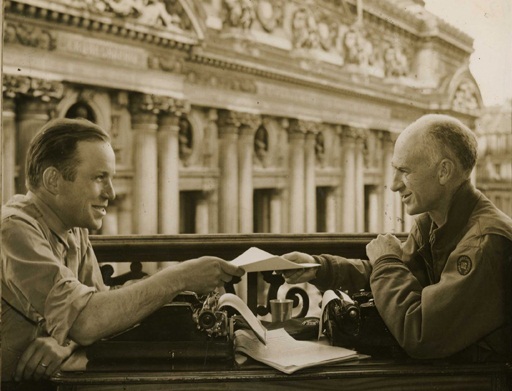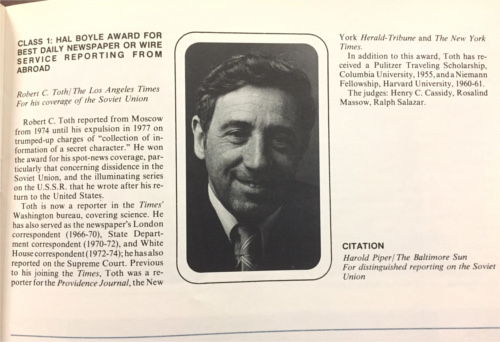
Associated Press writer Hal Boyle (left) with Ernie Pyle, at the Grand Hotel in Paris in September 1944.
By Amy Russo
As the OPC’s award submission season kicks off, we are taking a moment to consider the careers and legacies of namesakes behind some of the 22 awards. Each year since 1978, the OPC has honored journalists with the Hal Boyle Award to recognize the best newspaper, news service or digital reporting from abroad. [The wording of the description has changed over the years along with the evolution of the industry.]
Hal Boyle himself was a legendary war correspondent who won a Pulitzer Prize in 1945 for his coverage of World War II for The Associated Press. Boyle was only 17 years old when he joined the AP in 1928 as a copy boy at the organization’s Kansas City bureau. He graduated from the University of Missouri in 1932.
He was known for taking risks and worked on the front lines of both the European and Pacific theaters. He wrote more than 7,600 columns over the course of his career, which were published in 700 newspapers across the U.S.
In 1951, the Veterans of Foreign Wars awarded him the Omar Bradley Award for his coverage of the Korean War.
Early in his career, Boyle nicknamed himself “the poor man’s Ernie Pyle,” a joke he’d made while working with Pyle, who had already received accolades for his work, including a Pulitzer Prize, at a time when Boyle was a relative unknown. Boyle went on to win a Pulitzer in 1944. A book of Boyle’s columns was published in 1969, entitled Help, Help! Another Day!: The World of Hal Boyle.
According to a remembrance by George E. Burns in the October 1995 issue of the Bulletin, Boyle was “a delight in conversation, a raconteur, unpredictable, thoughtful, witty, and loved listening to stories.”
Boyle died of a heart attack in 1974 at age 63 in New York City. He had been diagnosed with “Lou Gehrig’s Disease” just months before his death, and wrote his own obituary, which was published on the front page of the Bulletin before his death. He wrote lightheartedly of his diagnosis, saying he was the “the first kid on my block to get amytrophic lateral sclerosis.” A memorial service drew a crowd of nearly 300 people.
In 1978, the OPC gave the first Hal Boyle Award to Robert C. Toth of the Los Angeles Times for his coverage of the Soviet Union. Toth had reported from Moscow from 1974 until he was expelled in 1977 on charges of “collection of information of a secret character,” according to the 1978 Dateline. Judges said Toth was honored in particular for his coverage of “dissidence in the Sovient Union and the illuminating series he wrote on the U.S.S.R after his return to the United States.”
Over the years since its inauguration, the Hal Boyle Award has honored reporters working at a range of media companies, including The New York Times, The Washington Post, United Press International and most recently the news organization where Boyle himself carved out his legacy, the AP.
This is the first in a periodic series of stories about the journalists who have had OPC awards named in their honor.

